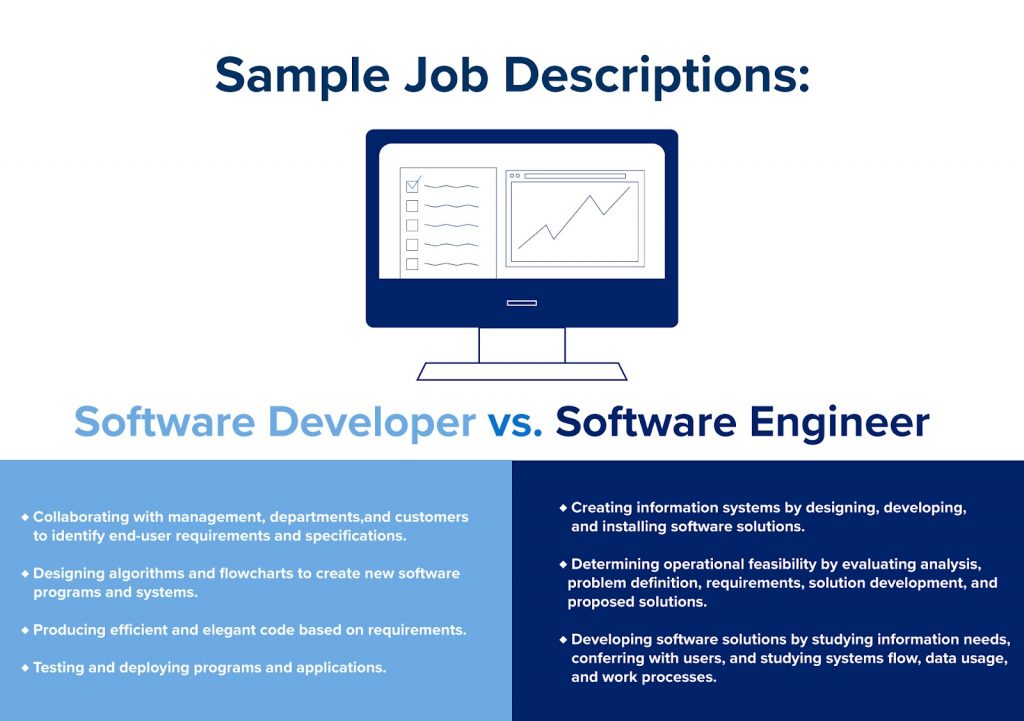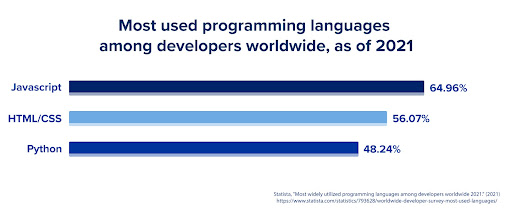Programmers, software developers, software engineers — you may have always wondered, “What’s the difference?” Some people use these high-tech job titles interchangeably, and while software engineers and software developers have similar, sometimes overlapping job responsibilities, these roles are much more nuanced than it may initially appear.
In this article, we’ll discuss the differences between software engineers and software developers, the top skills necessary for success in each role, and what you need to know to get started in either field.
What’s The Difference Between Software Developers and Software Engineers?
The main difference between these two positions is one of scope. Generally, software developers are in charge of designing and implementing an individual piece of software, or features within an existing piece of software. Developer roles can involve designing, planning, and writing code for pieces of software.
Software engineers, on the other hand, are usually responsible for architecting and designing large, complex enterprise systems for major companies. Often, software engineers create plans and blueprints for software systems — even though they might not be doing much of the coding themselves. However, software engineers still have a vast wealth of knowledge of programming languages and concepts.
All programming-related job roles, including both software engineers and software developers, need to have a deep understanding of programming languages. Completing a coding bootcamp can help you get started with some essential programming languages for software careers.
Below, we dive deeper into each unique role so you can learn more about their positions and decide which career path might be the best suited for you.
Software Developer vs. Programmer: What’s The Difference?
The difference between software developers and programmers can feel fuzzy — the biggest difference concerns their scope of work. Programmers are well-versed in programming languages and can use their knowledge to create software. However, programmers typically aren’t involved with planning software. Programmers typically write and test code using blueprints from other members of a team.
Software developers typically have a higher-level scope of work. In larger organizations, developers might plan software projects and turn their plans over to a team of programmers to implement. Developers at smaller companies might both plan pieces of software and write the code.
The biggest difference between software developers and programmers is one of scope — developers are typically involved in planning, designing, and sometimes coding a piece of software, while programmers are usually only responsible for the code itself.
Software Engineer vs. Web Developer: What’s The Difference?
Software engineers and web developers might work together on certain types of projects, but their roles are very different. As we’ll discuss in the next section, software engineers use the software development life cycle (SDLC) to architect and design complex enterprise applications. Web developers build and maintain websites and other web applications. This can include the front-end visual interface or back-end server-side services. Both fields are very technical and require a high level of skill and competency, but generally, web development requires less of an educational background to get started.
Are you interested in becoming a web developer or learning more about the process? Read our guide on how to become a web developer.
Software Engineer vs. Developer Responsibilities
Software engineers and developers typically contribute to creating software or other applications, but at different levels of detail. Read on to see exactly how their scope of work varies.
What Does a Software Engineer Do?
Software engineers usually use engineering concepts to create large, complex enterprise software systems. Their responsibilities can be broad, requiring knowledge of planning software development, integrating software with existing systems, and the software development process more broadly. You can think of a software engineer as an architect, using their knowledge of the software development process to plan out the structure of a complex project.
Software engineers are well-versed in the software development life cycle, also known as the SDLC. This is a process used in software development to design, develop, and test software with the aim of producing a high-quality product. The SDLC involves planning, defining, designing, building, testing, and deploying software
Software engineers are in high demand and typically command higher salaries (we’ll discuss this in more detail later on). If you want to learn how to become a software engineer, our guide can help you get started.

 Live Chat
Live Chat

